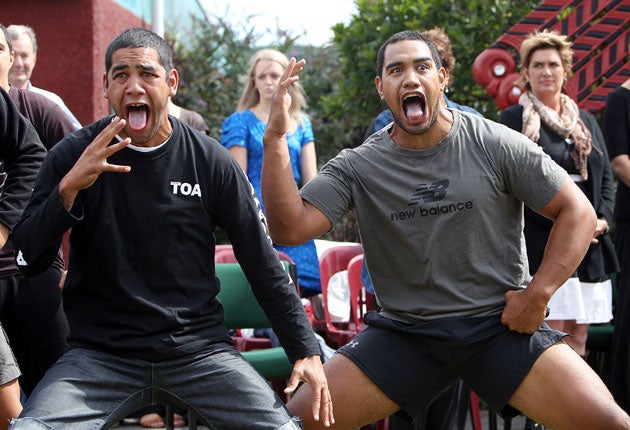Two tribes declare truce to save World Cup haka

Your support helps us to tell the story
From reproductive rights to climate change to Big Tech, The Independent is on the ground when the story is developing. Whether it's investigating the financials of Elon Musk's pro-Trump PAC or producing our latest documentary, 'The A Word', which shines a light on the American women fighting for reproductive rights, we know how important it is to parse out the facts from the messaging.
At such a critical moment in US history, we need reporters on the ground. Your donation allows us to keep sending journalists to speak to both sides of the story.
The Independent is trusted by Americans across the entire political spectrum. And unlike many other quality news outlets, we choose not to lock Americans out of our reporting and analysis with paywalls. We believe quality journalism should be available to everyone, paid for by those who can afford it.
Your support makes all the difference.The prospect of New Zealand's All Blacks having to compete at a Rugby World Cup on home turf without the help of their traditional haka, or war dance, was even more awful than the dance itself.
Fortunately, a dispute that threatened the team's performance of the haka has been resolved, following talks with the Maori tribe whose ancestors created it. That means the All Blacks will be stamping their feet, rolling their eyes and emitting fearsome growls before each of their World Cup matches later this year.
The problems arose in 2009 after the Ngati Toa tribe was granted intellectual property rights to the haka – performed by the New Zealand team before the start of every international match since 1905. The tribe threatened to trademark parts of it, raising the possibility of a legal battle.
But now the New Zealand Rugby Union (NZRU) says it has reached an agreement with the Ngati Toa that would allow the All Blacks to maintain the tradition. Details of the deal were not disclosed, although the NZRU has in the past expressed reluctance to pay money, saying that reducing the haka to a commercial commodity would demean it.
A Ngati Toa representative, Riki Wineera, said the NZRU had assured the tribe that the haka, called Ka Mate, would be treated respectfully. "One of the iwi's [tribe's] long-standing concerns is that Ka Mate has been used in a belittling and culturally offensive way," he said.
The Spice Girls were criticised in 1997 when they performed a version of the war dance at a concert in Bali.
The Ngati Toa have invited the All Blacks to take a refresher course before the World Cup.
Join our commenting forum
Join thought-provoking conversations, follow other Independent readers and see their replies
Comments